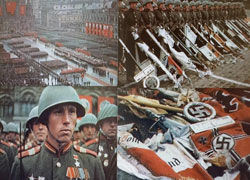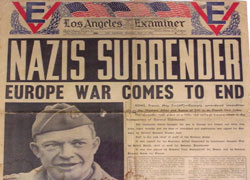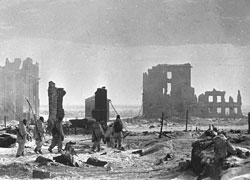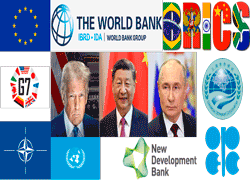The Russian V-Day Story (Or the History of World War II Not Often Heard in the West)
 Every May 9th the Russian Federation celebrates its most important national holiday, Victory Day, den’ pobedy. During the early hours of that day in 1945 Marshal Georgy Konstantinovich Zhukov, commander of the 1st Belorussian Front, which had stormed Berlin, received the German unconditional surrender. The Great Patriotic War had gone on for 1418 days of unimaginable violence, brutality and destruction. From Stalingrad and the northern Caucasus and from the northwestern outskirts of Moscow to the western frontiers of the Soviet Union to Sevastopol in the south and Leningrad and the borders with Finland, in the north, the country had been laid waste. An estimated 17 million civilians, men, women and children, had perished, although no one will ever know the exact figure. Villages and towns were destroyed; families were wiped out without anyone to remember them or mourn their deaths.
Every May 9th the Russian Federation celebrates its most important national holiday, Victory Day, den’ pobedy. During the early hours of that day in 1945 Marshal Georgy Konstantinovich Zhukov, commander of the 1st Belorussian Front, which had stormed Berlin, received the German unconditional surrender. The Great Patriotic War had gone on for 1418 days of unimaginable violence, brutality and destruction. From Stalingrad and the northern Caucasus and from the northwestern outskirts of Moscow to the western frontiers of the Soviet Union to Sevastopol in the south and Leningrad and the borders with Finland, in the north, the country had been laid waste. An estimated 17 million civilians, men, women and children, had perished, although no one will ever know the exact figure. Villages and towns were destroyed; families were wiped out without anyone to remember them or mourn their deaths.




 May 7, we commemorate the surrender of Nazi Germany.
May 7, we commemorate the surrender of Nazi Germany. During the fighting in the Soviet Winter Campaign, in mid-February 1942 the German Army had recovered its poise, as the situation stabilised for the invaders. Across the Eastern front, the Germans were able to hold on to most of the territory they had captured by early December 1941.
During the fighting in the Soviet Winter Campaign, in mid-February 1942 the German Army had recovered its poise, as the situation stabilised for the invaders. Across the Eastern front, the Germans were able to hold on to most of the territory they had captured by early December 1941.